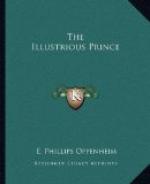“A coward always,” he murmured to himself, a little wearily, for he knew where his weakness lay,—an invincible repugnance to the ugly things of life. As he passed on, however, his spirits rose again. He caught a breath of lilac scent from a closed florist’s shop. He looked up to the skies, over the housetops, faintly blue, growing clearer every moment. Almost he fancied that he looked again into the eyes of this strange girl, recalled her unexpected yet delightful frankness, which to him, with his love of abstract truth, was, after all, so fascinating. Oh, there was much to be said for this Western world!—much to be said for those whose part it was to live in it! Yet, never so much as during that brief night walk through the silent streets, did he realize how absolutely unfitted he was to be even a temporary sojourner in this vast city. What would they say of him if they knew,—of him, a breaker of their laws, a guest, and yet a sinner against all their conventions; a guest, and yet one whose hand it was which would strike them, some day or other, the great blow! What would she think of him? He wondered whether she would realize the truth, whether she would understand. Almost as he asked himself the question, he smiled. To him it seemed a strange proof of the danger in which a weaker man would stand of passing under the yoke of this hateful Western civilization. To dream of her—yes! To see her face shining upon him from every beautiful place, to feel the delight of her presence with every delicious sensation,—the warmth of the sunlight, the perfume of the blossoms he loved! There was joy in this, the joy of the artist and the lover. But to find her in his life, a real person, a daughter of this new world, whose every instinct would be at war with his—that way lay slavery! He brushed the very thought from him.
As he reached the door of his house in St. James’ Square, it opened slowly before him. He had brought his own servants from his own country, and in their master’s absence sleep was not for them. His butler spoke to him in his own language. The Prince nodded and passed on. On his study table—a curious note of modernism where everything seemed to belong to a bygone world—was a cablegram. He tore it open. It consisted of one word only. He let the thin paper fall fluttering from his fingers. So the time was fixed!
Then Soto came gliding noiselessly into the room, fully dressed, with tireless eyes but wan face,—Soto, the prototype of his master, the most perfect secretary and servant evolved through all the years.
“Master,” he said, “there has been trouble here. An Englishman came with this card.”
The Prince took it, and read the name of Inspector Jacks.
“Well?” he murmured.
“The man asked questions,” Soto continued. “We spoke English so badly that he was puzzled. He went away, but he will come again.”
The Prince smiled, and laid his hand almost caressingly upon the other’s shoulder.




